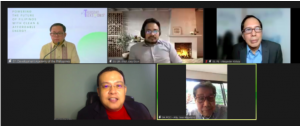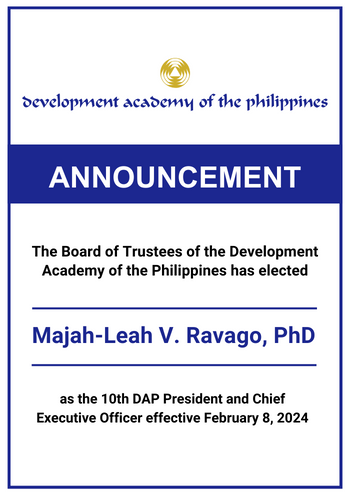
TOP L-R: Dr. Alan Cajes, Dr. Joey Ocon, Mr. Alexander Ablaza; BOTTOM L-R: Atty. Felix William Fuentebella, Atty. Jose Alejandro via Zoom platform – Photo Collage by Natalie Narciso.
16 September 2021 – The Development Academy of the Philippines, through its Center for Governance – Policy Research Office (CfG-PRO), held the fifth installment of the Thursday Talks Webinar series entitled “Powering the Future of Filipinos with Clean and Affordable Energy” under the Capability Building on Innovative Leadership for Legislative Staff (CBILLS) program. The webinar covered the Philippine National Energy Plan and Roadmaps, and the future of the country’s energy mix and financing.
During the first session, Department of Energy Undersecretary Felix William Fuentebella gave an overview of the energy sector, including the sources and demands in the country, associated challenges, opportunities, policies, and outlooks.
This was followed by a panel discussion with Philippine Energy Alliance Inc. (PE2) President Alexander Ablaza, Energy and Power Committee of the Philippine Chamber of Commerce and Industry, Inc. (PCCI) Adviser Atty. Jose Alejandro, and Dr. Joey Ocon from the University of the Philippines.
Mr. Ablaza provided a review on energy efficiency and financing by underscoring what the economy can benefit from and identifying the needs to put in to achieve the EE&C (Energy Efficiency and Conservation) roadmap targets by 2040.
Following him, Atty. Alejandro emphasized that there should be urgency, focus, integrity, creativity, and courage in the economic plans with the energy sector since power is a major engine in reviving the economy after the pandemic.
Meanwhile, Dr. Ocon recommended that the PH government should intervene by using its regulatory and economic levers to achieve just energy transition towards a fully renewable and sustainable energy system.
In the open forum moderated by DAP Corporate Communications Center Vice-President Dr. Alan Cajes, questions regarding EPIRA’s implementation, policies on geothermal and nuclear power plant capacity, consumption report compliance, and the impact of the clean energy and EE Act on direct consumers deepened and enriched the discussion on clean and affordable energy in the country. Afterwards, the resource persons and panel members gave their final comments on how they see the future of clean and affordable energy in the country.
Atty. Alejandro affirmed that power is the most vital part of the economy, and that there’s a demand for fast solutions and simple programs with the least cost of utilities and government services to revive the economy after the COVID-19 pandemic.
Mr. Ablaza shared that the country is at a good start with mainstreaming EE&C as a way of life, and that there should be a continuous discussion on energy financing to attract investors for equity capital flow.
Dr. Ocon emphasized the roles of the academe in conducting research, as they focus on long-term benefits rather than short-term horizons. In addition, he highlighted the importance of linkages with other sectors to support the implementation of the Philippine National Energy
Plan, especially with the recent signing of a law creating the Philippine Energy Research and Policy Institute (PERPI) in UP.
Usec. Fuentebella underscored that the Philippine Energy Plan shall serve as a jumpstart for initiatives and programs on Energy Efficiency, Renewable Energy, Energy Technology, Resiliency, and Financing. He also stressed that there should be interdisciplinary efforts in formulating plans and suggestions to achieve a clean energy scenario in the country.
Dr. Cajes ended the forum by highlighting the relation of the webinar’s topic with the country’s move to contribute to the realization of the Sustainable Development Goals 7 (Affordable and Clean Energy) and 13 (Climate Action). He stressed that there’s a consensus among the speakers that we are equitably accountable for the energy we utilize, and that there’s still a need for financial, technical, and policy support on all sectors to achieve the Philippine National Energy Plan and improve the country’s economic performance.
The live stream of this event can still be accessed through the Policy Research Office Facebook Page at www.facebook.com/DAPCFGPRO. The sixth installment of the webinar will be held on October 28.




